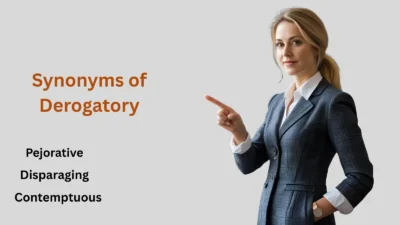Irony is everywhere—from sarcastic jokes to unexpected plot twists—but finding other ways to say it isn’t always easy. Whether you’re a student analyzing literature or a writer crafting clever scenes, relying too much on the word irony can feel repetitive or flat. That’s why it helps to explore strong synonyms of irony that bring out different shades of meaning, like sarcasm, satire, paradox, or wryness.
In this guide, we’ll dive into the top synonyms of irony, explain how they differ, and show you exactly when to use them.
Because sometimes, the twist isn’t just in the story—it’s in how you choose your words.
Each irony synonym offers its tone, from playful to biting, and helps you shape your message more precisely. Whether you’re writing fiction, essays, or just making a point, these alternatives give your language more edge.
What Is Irony?
At its core, irony involves saying one thing but meaning another, often the opposite. For example, saying “Oh, great!” when your laptop crashes is sarcasm—a form of irony with a sharp tone. It’s a way to highlight contrasts between expectations and reality, or to add humor or criticism without saying it outright. Irony can be:
- Verbal: When your words mean the opposite of what they say.
- Situational: When the outcome of a situation is the opposite of what you’d expect.
- Dramatic: When the audience knows something the characters don’t.
Explore the best ironic synonyms to describe sarcasm, unexpected twists, and humorous contrasts in writing and speech.
Synonyms of Irony: Meanings, Examples, and When to Use Them
1. Sarcasm
Meaning: A sharp, often cutting remark meant to mock or convey contempt.
Example: Saying “Great job!” when someone spills coffee everywhere.
When to use: When you want to be mocking or teasing, often with humor or irritation.
2. Satire
Meaning: Using humor, irony, or exaggeration to criticize or expose folly.
Example: A cartoon that mocks political leaders.
When to use: When addressing social or political issues with a critical tone.
3. Paradox
Meaning: A statement that contradicts itself but reveals a truth.
Example: “Less is more.”
When to use: When emphasizing a deeper, thought-provoking contradiction.
4. Mockery
Meaning: Ridiculing or imitating something to make fun of it.
Example: Mimicking a friend’s exaggerated accent.
When to use: When the tone is openly derisive or teasing.
5. Sardonicism
Meaning: Grimly mocking or cynical humor.
Example: “Oh great, another Monday,” said with a dry tone.
When to use: When the humor is dark, bitter, or disdainful.
6. Wryness
Meaning: Dry, subtle humor with a twist of irony.
Example: “Well, that went well,” after a minor mishap.
When to use: When your irony is understated and clever rather than harsh.
7. Parody
Meaning: Imitation with exaggeration to make fun.
Example: A spoof of a popular movie.
When to use: When you want to entertain by exaggerating characteristics.
8. Understatement
Meaning: Deliberately making something seem less important than it is.
Example: Saying “It’s just a scratch” when there’s a big dent.
When to use: When you want to be modest or subtly humorous.
9. Double Entendre
Meaning: A phrase with two meanings, often one risqué or ironic.
Example: “That’s a tough nut to crack.”
When to use: When you want to imply something humorous or suggestive.
10. Cynicism
Meaning: Belief that people are motivated by selfishness, often expressed through irony.
Example: “Politicians always tell the truth, right?”
When to use: When expressing distrust or skepticism with a sarcastic edge.
11. Dry Humor
Meaning: Humor delivered with a straight face, without showing emotion.
Example: “I’m not arguing, I’m just explaining why I’m right.”
When to use: When your irony is subtle and understated.
12. Absurdity
Meaning: Something ridiculously unreasonable or nonsensical, often highlighting irony.
Example: A sign that says “No signs allowed.”
When to use: When pointing out ridiculous contradictions or illogical situations.
13. Satirical Irony
Meaning: Irony used specifically to expose or criticize societal flaws.
Example: Using irony to mock consumer culture.
When to use: For social commentary with a sharp edge.
14. Facetiousness
Meaning: Treating serious issues with deliberately inappropriate humor.
Example: “Sure, I’ll do your homework. When pigs fly.”
When to use: When joking around without intending offense.
15. Tongue-in-Cheek
Meaning: Saying something ironically but humorously or playfully.
Example: “Oh, I’m just a humble genius.”
When to use: When you want to be playful and not taken too seriously.
16. Incongruity
Meaning: When something is out of place or doesn’t fit expectations.
Example: A tuxedo-wearing dog.
When to use: When highlighting contrasts that are amusing or thought-provoking.
17. Satirical Wit
Meaning: Clever humor used to criticize.
Example: A witty remark about bureaucracy.
When to use: When combining intelligence and humor to make a point.
18. Lampoon
Meaning: Publicly criticize through irony and ridicule.
Example: A comic strip lampooning celebrities.
When to use: For harsh, public satire.
19. Ridicule
Meaning: Mocking or making fun of someone or something.
Example: Laughing at outdated fashion.
When to use: When the tone is openly scornful or harsh.
20. Caustic Humor
Meaning: Biting, harsh, and often hurtful irony.
Example: “Nice job, Einstein.”
When to use: When the goal is to sting or criticize sharply.
21. Ironical Twist
Meaning: A surprising and opposite outcome or statement.
Example: “The fire station burned down.”
When to use: When pointing out unexpected contradictions.
22. Scorn
Meaning: Contempt or disdain expressed ironically.
Example: “Oh, brilliant idea,” said sarcastically to a bad plan.
When to use: When the tone is dismissive or derisive.
23. Deadpan
Meaning: Delivering irony without showing emotion.
Example: “I love waiting in traffic,” said with no smile.
When to use: When subtlety and expressionless delivery enhance the humor.
24. Self-Deprecation
Meaning: Making fun of oneself in a humorous, ironic way.
Example: “I’m an expert at procrastination.”
When to use: When you want to be humble and relatable.
25. Skepticism
Meaning: Doubting or questioning with an ironic tone.
Example: “Sure, that plan will work perfectly.”
When to use: When expressing doubt or disbelief humorously.
26. Paronomasia (Pun)
Meaning: A play on words to create irony or humor.
Example: “Time flies like an arrow; fruit flies like a banana.”
When to use: For lighthearted wordplay.
27. Dry Sarcasm
Meaning: Sarcasm delivered without emotional cues.
Example: “Yeah, because that’s never happened before.”
When to use: When you want to be sarcastic but subtle.
28. Comic Irony
Meaning: Irony used to create laughter or amusement.
Example: A character saying “I’m an expert” right before messing up.
When to use: For humor without malice.
29. Ironical Sarcasm
Meaning: Sarcasm with a strong ironic twist.
Example: “Oh, fantastic! Another meeting!”
When to use: When you want sarcasm that emphasizes contradiction.
30. Satirical Sarcasm
Meaning: Sarcasm used specifically to mock or criticize society.
Example: A sarcastic comment about consumerism.
When to use: When blending irony, sarcasm, and social critique.
How to Choose the Right Synonym for Irony?
- Consider your tone: Want to be playful? Go for tongue-in-cheek or wryness. More biting? Try caustic humor or sardonicism.
- Think about your audience: Sarcasm and ridicule can offend; satire and parody work better for broader critique.
- Match the context: Understatement suits subtle humor, while lampoon fits sharp public critique.
- Emotional nuance: For gentle teasing, dry humor or self-deprecation works well; for cynicism or distrust, cynicism or skepticism fits better.
- Cultural sensitivity: Sarcasm and irony are sometimes lost or misunderstood across cultures, so simpler comic irony or parody may be safer.
Conclusion
Irony isn’t just one idea—it’s a spectrum of tone, meaning, and intent. From light-hearted wryness to sharp sarcasm or clever satire, the words you choose can completely change how your message is received. Now that you’ve explored the most useful synonyms of irony, you have the tools to express contrast, contradiction, and humor with more precision.
If you’re writing an essay, telling a story, or crafting a punchline, each synonym offers its own unique twist.
So the next time you think “irony,” ask yourself—do you mean sarcasm, paradox, satire, or something else entirely?
Words matter. And when they’re chosen well, even irony can make perfect sense.



